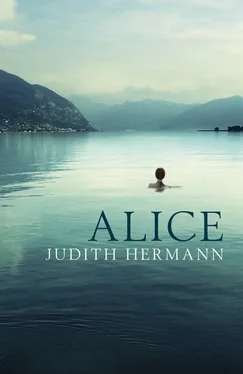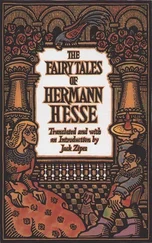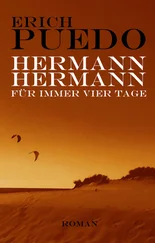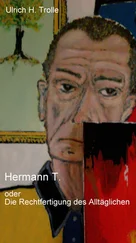Judith Hermann - Alice
Здесь есть возможность читать онлайн «Judith Hermann - Alice» весь текст электронной книги совершенно бесплатно (целиком полную версию без сокращений). В некоторых случаях можно слушать аудио, скачать через торрент в формате fb2 и присутствует краткое содержание. Год выпуска: 2011, Издательство: Clerkenwell, Жанр: Современная проза, на английском языке. Описание произведения, (предисловие) а так же отзывы посетителей доступны на портале библиотеки ЛибКат.
- Название:Alice
- Автор:
- Издательство:Clerkenwell
- Жанр:
- Год:2011
- ISBN:нет данных
- Рейтинг книги:3 / 5. Голосов: 1
-
Избранное:Добавить в избранное
- Отзывы:
-
Ваша оценка:
- 60
- 1
- 2
- 3
- 4
- 5
Alice: краткое содержание, описание и аннотация
Предлагаем к чтению аннотацию, описание, краткое содержание или предисловие (зависит от того, что написал сам автор книги «Alice»). Если вы не нашли необходимую информацию о книге — напишите в комментариях, мы постараемся отыскать её.
Alice — читать онлайн бесплатно полную книгу (весь текст) целиком
Ниже представлен текст книги, разбитый по страницам. Система сохранения места последней прочитанной страницы, позволяет с удобством читать онлайн бесплатно книгу «Alice», без необходимости каждый раз заново искать на чём Вы остановились. Поставьте закладку, и сможете в любой момент перейти на страницу, на которой закончили чтение.
Интервал:
Закладка:
Judith Hermann
Alice
I. Misha
But Misha didn’t die. Not during the night from Monday to Tuesday, nor the night from Tuesday to Wednesday; perhaps he would die Wednesday evening or later that night. Alice thought she had heard it said that most people die at night. The doctors weren’t saying anything any more; they shrugged their shoulders and held out their empty, disinfected hands. There’s nothing more we can do. Sorry.
And so Alice, Maja, and Maja’s child had to look for another place to stay. Another holiday apartment, because Misha couldn’t die. Their present holiday apartment was too small. They really needed at least two bedrooms, one for Maja and the child and the other for Alice, as well as a living room with a TV for the evenings, a halfway decently equipped kitchen to take care of the child’s needs, a bath with a bathtub. A garden? Or a window with a view of something beautiful.
In the hospital, Misha was wearing a hospital gown printed all over with blue diamonds. He was reduced to skin and bones, a skeleton; but his hands were as they had always been — they were also soft and warm. On his bedside table there was nothing now except a bottle of mineral water and a sipper cup. Though by now he’d even stopped drinking water.
Alice packed her overnight bag. A nightgown, three T-shirts, three sweaters, a pair of slacks, underwear, a book. She sat down on the wicker sofa among the cushions and rolled a green plastic ball with a little bell tinkling inside it across the tiled tabletop towards the child. The child was already able to stand at the low living-room table, proudly, holding on to the tabletop with both hands. She didn’t react to the ball, but emphatically repeated the word ‘rabbit’ several times in a row. Very clearly. Maja was on the phone with the owner of a holiday apartment at the other end of town. Cheaper. Three rooms. With a garden. A washing machine too, yes, of course. No further from the hospital than this one-room place with its fake forsythia in a vase on the built-in cupboard, the framed photo above the TV showing the sun setting into an empty lake, the folding bed on which Alice had slept in front of the built-in cupboard, the double bed in the corner, and the wicker sofa pushed to the window. The curtains were drawn aside and the view was of a supermarket car park, vehicles coming and going, and people pushing brimful shopping trolleys.
… in the Catholic hospital, Maja was saying on the phone. My husband is in the Catholic hospital. She was sitting on the edge of the bed, her head cradled in her hand, her face turned away. Alice gazed at her back. Now the child had decided to take the plastic ball after all, lifting it up and shaking it hard, listening to the little bell with a rapt expression on her face.
We’re moving, Alice said to the child. We’re moving to another place. It’s going to be really nice there, you’ll see. There’s a bathtub. A garden — we can go outside every morning. Trees. A lawn. Maybe rabbits, we’ll see, maybe we can catch one.
The child didn’t reply. She looked at Alice, a long look full of mysterious significance. A clear drop of spit trembled on her little chin. She was Misha’s child and looked a lot like her father.
The way things had turned out, Misha now lay dying in Zweibrücken — Two Bridges. The name sounded poetic to Alice, but it presented a distorted image, because for the dying man there was only one bridge, if any at all. For whom was the second one? Zweibrücken turned out to be the end of an odyssey that had led from one hospital to another — and then in the end and by coincidence it happened to be a Catholic hospital in a town far from home where Misha now lay dying. He might have joked about it if he’d had the strength. But he no longer did. He had cancer and was on morphine, was nearly gone. Alice wasn’t even sure whether the sound he made when she sat by his bed and put his hand in hers was intended as an expression of pain or acceptance. The doctors, who had withdrawn from the case a week ago, still hovered in the background out of courtesy. Now and then, one of them would come by and pretend to take his temperature or feel his pulse. For days they had predicted his death, but he didn’t die. Kept breathing, in and out. In and out. In and out. That was all.
Maja was putting a fresh nappy on the child. On the double bed. The child was beautiful, her skin soft and white. On her back there was a heart-shaped birthmark, a mark of distinction. Alice sat on the wicker sofa and watched as Maja changed the child’s nappy, holding both little legs in her left hand and gently raising the child by her little feet.
We’ll take a taxi, Maja said. Could you call for one. In ten minutes.
OK, Alice said.
They didn’t talk much. Sometimes more, sometimes less; it wasn’t awkward. The night before they had sat next to each other in silence, watching the child eat pizza. For quite a while. Alice got up and washed the last of the dishes, two coffee mugs, two plates, the small bowl from which the child had eaten a lunch of plain yogurt with banana slices. Please pack up the things from the refrigerator, too, Maja said. She told the child to lie still. Don’t move — just for a moment.
There were eggs, fish, tomatoes and a piece of butter in the refrigerator. And fennel tea, potatoes, apples, and pears. Plus three bottles of beer and a bottle of wine. In the pot on the stove there were sterilised teats and the child’s feeding bottle. Alice unfolded two bright yellow bags, feeling unduly helpless — she wanted to do everything just so.
Then the landlord was standing at the door. He had knocked inaudibly, just wanted to check whether everything was all right. Alice counted some notes into his outstretched hand; she saw no reason to lie to him. No. We’re not leaving town, we’re just moving; this place is really too small for us. But otherwise everything’s fine. Thank you very much. No, it will still take a while. It’s not over yet. The doctors say he’s very strong. The landlord smiled, a crooked, ineffectual smile; he looked quite awkward, but what else could he do.
Where will you be going?
To the outskirts of town, Maja called out from the bed. There’s supposed to be a garden there; that’s better for the child. But thanks for everything. Thank you very much all the same.
Maja and the child had been in Zweibrücken for ten days. They had come by plane; it was the child’s first time flying, and she didn’t cry at take-off or landing. Maja had booked the holiday apartment from Berlin, had told the landlord that she wasn’t coming to Zweibrücken on holiday. Did anyone ever go to Zweibrücken on holiday? The landlord didn’t have an answer. Forty euros a night for the room, the forsythia, and a bath with a shower. On their fourth day there the child had started crying inconsolably as soon as they were on the street leading to the hospital, and that’s when Maja had phoned Alice.
Can you come? Misha is dying. Don’t you want to see him once more? I need someone to look after the child; she no longer wants to go to the hospital with me.
Alice was tempted to ask, Do you think Misha wants to see me? Don’t you think it might be too much for him? But how could Maja know whether Misha wanted to see Alice or not.
Instead she had asked, What’s the matter with the child?
Maja had thought for a moment and then she said, The child no longer reacts to Misha as if he were a person. I can’t take her into his hospital room any more. But I want to be with him. You understand that, don’t you?
Alice left Berlin the next day. She barely knew Maja. She knew Misha. Of course she wanted to see him one more time; what kind of a question was that. There had been times when she thought she couldn’t live if she couldn’t see Misha’s face any more. She had often told him that, and each time he had laughed good-naturedly. But she also thought he would die while the train in which she sat was rolling through the desolate and ugly landscape; she considered herself so important that she assumed Misha would die because she was coming and before she could be at his side.
Читать дальшеИнтервал:
Закладка:
Похожие книги на «Alice»
Представляем Вашему вниманию похожие книги на «Alice» списком для выбора. Мы отобрали схожую по названию и смыслу литературу в надежде предоставить читателям больше вариантов отыскать новые, интересные, ещё непрочитанные произведения.
Обсуждение, отзывы о книге «Alice» и просто собственные мнения читателей. Оставьте ваши комментарии, напишите, что Вы думаете о произведении, его смысле или главных героях. Укажите что конкретно понравилось, а что нет, и почему Вы так считаете.












